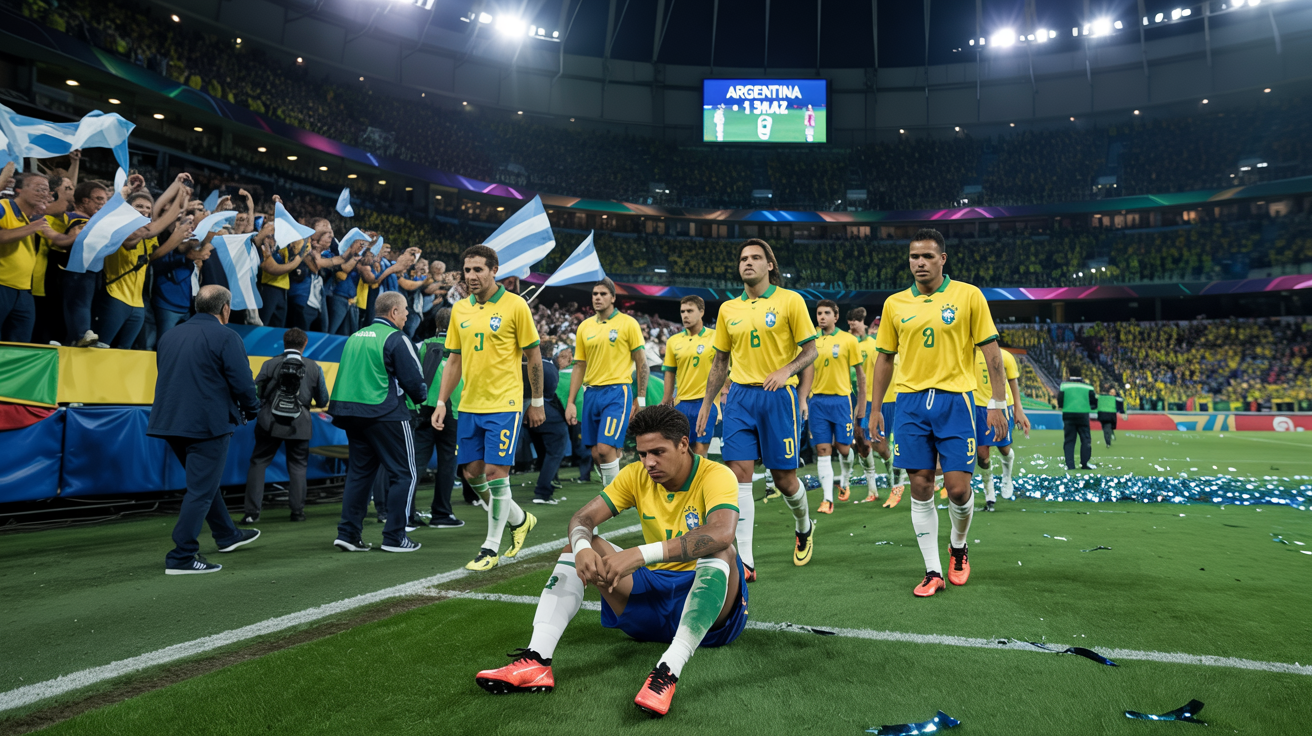In a night that will be remembered as one of the darkest chapters in Brazil’s World Cup Qualifying history, the Seleção suffered a 4–1 defeat to Argentina, marking the largest margin of loss to their South American rivals in the history of the competition. The result not only shocked fans across the country but also sparked immediate action from the Brazilian Football Confederation (CBF), which has launched a comprehensive review of the team’s technical structure.
The match, played in Buenos Aires, was expected to be intense — but few predicted such a one-sided outcome.
A Collapse in Confidence
Despite starting the game with an aggressive lineup, Brazil looked disjointed from the opening whistle. Defensive lapses, lack of midfield cohesion, and failure to adapt tactically allowed Argentina to dominate possession and create chance after chance.
Goals from Lionel Messi, Ángel Di María, Julián Álvarez, and Enzo Fernández sealed Brazil’s fate. The only Brazilian goal came from Rodrygo, who converted a rebound in the 75th minute, long after the match was already beyond reach.
The 4–1 scoreline marks:
- Brazil’s first time conceding 4 goals in a World Cup Qualifier since 1993.
- Their worst loss to Argentina in any competitive match.
- The team’s third consecutive defeat in the qualification campaign.
Immediate Fallout and Institutional Response
The day after the match, the CBF convened an emergency meeting with technical staff and federation executives to assess the current situation. Interim president Ednaldo Rodrigues confirmed that a full review of the coaching strategy, player selection process, and support infrastructure is now underway.
In a brief press release, Rodrigues stated:
“This result does not reflect the tradition and quality of Brazilian football. We are listening to all stakeholders and making necessary adjustments to ensure our qualification to the 2026 World Cup.”
Sources within the CBF have also hinted that a foreign coach is being considered for the first time in decades, signaling a potential shift in philosophy.
Fans and Media React with Fury
The reaction from the Brazilian public has been swift and intense. Social media exploded with criticism of the team’s performance, and newspapers across the country featured headlines such as:
- “Humiliated in Buenos Aires”
- “The Seleção Has Lost Its Soul”
- “Time to Rebuild”
At airports, returning players were met with mixed reactions — from supportive fans to harsh critics demanding changes. Television pundits questioned not just the tactics, but the overall identity and mentality of the current generation of players.
Spotlight on Leadership and Player Development
While the defeat raises questions about coaching and preparation, it has also intensified scrutiny on the development pipeline of Brazilian football. Experts argue that despite the global success of individual players in European clubs, there’s a growing disconnect between club success and national team unity.
Calls are increasing for:
- Revamping youth development programs with a focus on collective play.
- Increasing the number of training camps between qualifiers.
- Reinstating domestic league stars who have been overlooked.
Veterans such as Casemiro and Thiago Silva have also called for calm, urging fans to support the players as they regroup for the next qualification window.
What’s Next for Brazil?
Despite the heavy loss, Brazil still has a mathematical chance to qualify for the 2026 FIFA World Cup. The expanded tournament format offers more slots for CONMEBOL teams, but continued poor results could push Brazil into playoff territory — an unthinkable scenario for a five-time world champion.
The next match against Ecuador, scheduled for June, is now considered a must-win. Training sessions will resume in May, with potential roster shake-ups and a new tactical system in play.
Conclusion: A Wake-Up Call for the Seleção
The 4–1 defeat to Argentina is more than a bad night — it’s a symbol of a national football identity in crisis. While the talent is undeniably present, the need for unity, leadership, and a clear vision has never been more urgent.
For Brazil to reclaim its status as the pinnacle of world football, the time for reflection is over. It’s time for reinvention.
